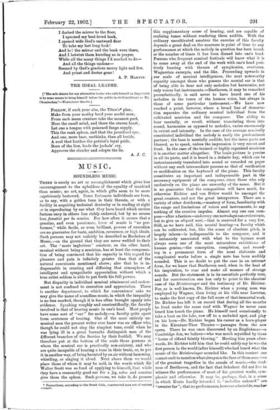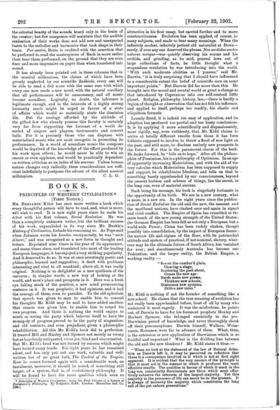MUSIC.
SOUNDLESS MUSIC.
THERE is surely no art or accomplishment which gives less encouragement to the upholders of the equality of mankind than music; no art, again, in which gifts seem to be more capriciously bestowed. Some fortunate individuals are born, so to say, with a, golden tune in their throats, or with a facility in acquiring technical dexterity or in reading at sight ar in reproducing by ear what they have heard which excites furious envy in others less richly endowed, but by no means less fanatiei per la musica. For how often it occurs that a genuine, and even passionate, lover of music is "no per- former," while facile, or even brilliant, powers of execution are no guarantee for taste, ambition, reverence, or high ideals. Such persons may not unfairly be described as Bachelors of Music,—on the ground that they are never wedded to their art. The "mute inglorious" amateur, on the other hand, musical without being a musician, has at least the compensa- tion of being convinced that his capacity in this regard for pleasure and pain is infinitely greater than that of the natural executants mentioned above ; also that he is in- dispensable in creating and diffusing that atmosphere of intelligent and sympathetic appreciation without which a true artist seldom is able to put forth his full powers.
But disparity in individual musical attainment and endow- ment is not confined to execution and appreciation. There is another department, to which for convenience' sake we may give the name of soundless music, in which the inequality is no less marked, though it is less often brought openly into evidence. Speaking roughly and unscientifically, the faculty involved is that of hearing music in one's head. Most people have some sort of " ear " for melody,—a faculty quite apart from acuteness of hearing. One of the most entirely un- musical men the present writer ever knew was an offieer who, though he could not sing the simplest tune, could when he was lying ill in a great barracks distinguish men of the different branches of the Service by their footfall. We may therefore put at the bottom of the scale those ,persons in whom the musical ear is practically non-existent, and who are quite incapable of hearing a tune in their brain, or, to put it in another way, of being haunted by an air without humming, whistling, or singing it aloud. Next above them we would place those of whom it may be said, in the words which Sir Walter Scott was so fond of applying to himself:that while they have a reasonably good ear for a jig, solos and sonatas give them the spleen. Such persons, we take it, do possess
• Prometheus, according to the Greek fable, constructed man out of various animals,
this supplementary sense of hearing, and are capable of realising tunes without rendering them audible. With the ordinary uncultivated amateur the exercise of this faculty depends a great deal on the nearness in point of time to any performance at which the melody in question has been heard, or the number of times it has been dinned into one's head. Persons who frequent musical festivals will know what it is to come away at the end of the week with one's head posi- tively buzzing with themes of symphonies, overtures, Wagnerian excerpts, and the like. Proceeding upwards in our scale of musical intelligences, the next noteworthy capacity amongst those who possess the mental ear is that of being able to hear not only melodies but harmonies, not only voices but instruments.—Beethoven, it may be remarked parenthetically, is said never to have heard one of his melodies in the tones of the human voice, but always in those of some particular instrument.—We have now reached a point, however, where a broad line of demarca- tion separates the ordinary musical individual from the cultivated musician and the composer. The ability to hear mentally, or recall, without translating them into sound, harmonies as opposed to melodies, varies enormously in extent and intensity. In the case of the average musically constituted individual the melody is easily the predominant partner; the bass is mentally audible, but the inner parts are blurred, so to speak, unless the impression is very recent and fresh. In the case of the trained or highly organised musician it is another matter altogether. The brain picture is precise in all its parts, and it is heard in a definite key, which can be instantaneously translated into sound or recorded on paper without any such intermediate process as that of verification or modification on the keyboard of the piano. This faculty constitutes an important and indispensable part in the necessary equipment of the composer, since those who rely exclusively on the piano are unworthy of the name. But it is no guarantee that the composition will have merit, for otherwise Richter and von Billow would be amongst the great creators, and not the great interpreters. There are a variety of other desiderata,—mastery of form, familiarity with the range and limitations of voices and instruments, to say nothing of the creative impulse. Almost any one can com- pose—after a faahion—and every one nowadays can orchestrate, but to give us aliquid novi,—that is reserved for a very few. Still, as we have said, this mental hearing—a faculty which can be cultivated, but, like the sense of absolute pitch, is largely inborn—is indispensable to the composer, and it is intimately associated with what to the layman must always seem one of the most miraculous exhibitions of human genius,—the conception, completion, and record- ing in a permanent form of the most elaborate and complicated works before a single note has been audibly sounded. This is no doubt to put the case in an extreme form, for we know that Beethoven used, when in the heat of his inspiration, to roar and make all manner of strange sounds. But the statement is in its essentials perfectly true, and for corroboration one has only to point to the classical case of the Meistersinger and the testimony of Dr. Richter. For, as is well known, Dr. Richter when a young man was employed by Wagner, then living at his villa near Lucerne, to make the first copy of the full score of that immortal work. Dr. Richter has left it on record that during all the months he lived under the same roof with Wagner he never once heard him touch the piano. He himself used occasionally to take a boat on the lake, row off to a secluded spot, and play on his horn—Dr. Richter began his career as a horn-player in the Kiirntner-Thor Theatre — passages from the new opera. There he was once discovered by an Englishman—a Cambridge don, we believe—who PM much mystified by these "horns of elfland faintly blowing." Meeting him years after- wards, Dr. Richter told him that he could safely say he was the first person in the world (after himself) who had heard what the music of the Meistersinger sounded like. In this context one cannot omit to mention what alwayslon the face of them seem two of the greatest tragedies in the annals of music,—the deaf- ness of Beethoven, and the fact that Schubert did not live to witness the performance of most of his greatest works, sym- phonic and otherwise. It may be, perhaps, that, in a sense in which Keats hardly intended it, "melodies unheard" are "sweeter far " ; that no performance, however admirable, reach so
the celestial beauty of the sounds heard only in the brain of the creator; but few composers will maintain that the audible realisation of their works does not add new and unexpected lustre to the melodies and harmonies that took shape in their brain. Per contra, Bono is credited with the assertion that he preferred to read the masterpieces of Bach in score rather than hear them performed, on the ground that they are even finer and more impressive on paper than when translated into sound.
It has already been pointed out in these columns that in the musical millennium, the claims of which have been grossly neglected by our scientific Zadkiels, every one will be able to read a full score with the same ease with which every one now reads a new novel, with the natural corollary that all performances will be unnecessary, and all music become soundless. Logically, no doubt, the inference is legitimate enough, and in the interests of a highly strung humanity much might be urged in favour of a state of affairs which would so materially abate the dominion din. But the analogy afforded by the attitude of the gifted few who already possess this faculty is certainly very far from supporting the forecast of a world de- nuded of singers and players, instruments and concert halls. For it is precisely those who can dispense with materialised music who are most energetic in promoting its performance. In a world of soundless music the composer would be deprived of the knowledge of the effect produced by his work upon others ; he would never be able to win an encore or even applause, and would be practically dependent on written criticism as an index of his success. Unless human nature changes very radically, these considerations are suffi- cient indefinitely to postpone the advent of the silent musical











































 Previous page
Previous page